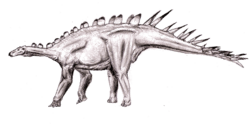Argiles d'Octeville
The Argiles d'Octeville (meaning Octeville Clay) is a geological formation in Normandy, France. It dates back to the Kimmeridgian stage of the Late Jurassic.[1] It is equivalent to the Kimmeridge Clay in England[2] and predominantly consists of claystone, with some limestone.[3] It is well exposed in cliff section at Cap de la Hève
| Argiles d'Octeville Stratigraphic range: Kimmeridgian | |
|---|---|
.jpg) Argiles d'Octeville exposed near the base of cliffs near Octeville-sur-Mer, with Chalk in the upper exposure | |
| Type | Geological formation |
| Sub-units | Argiles du Croquet inférieures, Argiles du Croquet supérieures, Argiles d'Ecqueville inférieures, Argiles d'Ecqueville médianes, Argiles d'Ecqueville supérieures |
| Underlies | Unconformity with Aptian sands |
| Overlies | Marnes de Bleville |
| Thickness | 34 metres |
| Lithology | |
| Primary | Claystone |
| Other | Limestone |
| Location | |
| Region | Normandy |
| Country | |
| Type section | |
| Named for | Octeville-sur-Mer |
Vertebrate fauna
| Reptiles of the Argiles d'Octeville | ||||||
|---|---|---|---|---|---|---|
| Taxa | Species | Presence | Material | Notes | Images | |
| Indeterminate[4] | Cliffs of Octeville, Cap de La Hève, Normandy | "Seven cervical vertebrae, seven dorsal vertebrae, a sacrum with seven fused centra and sacral ribs, the left ilium, the posterior ends of one pubis and one ischium, the first caudal vertebra and one femur" | Dacentrurine Stegosaur. Excavated in 1898[5]. First described as "Omosaurus lennieri" by Nopcsa in 1911[6] Remains destroyed by WW2 bombing in 1944. |
| ||
| Normannognathus[7] | N. wellnhoferi | Cliffs of Octeville, Cap de La Hève, Normandy | Left anterior portion of the skull and associated lower jaws | Pterosaur, indeterminate Monofenestratan. | ||
| Indeterminate |
|
| ||||
gollark: And balloons. And xenowyrms. And aeons...
gollark: I'd want a CB gold maybe to get coppers from it.
gollark: They breed awfully. Don't count on gifting any.
gollark: There's a balloon there too, so it's worth about three.
gollark: It also has a vaguely meaningful code.
See also
- List of dinosaur-bearing rock formations
References
- Weishampel, David B; et al. (2004). "Dinosaur distribution (Late Jurassic, Europe)." In: Weishampel, David B.; Dodson, Peter; and Osmólska, Halszka (eds.): The Dinosauria, 2nd, Berkeley: University of California Press. Pp. 545–549. ISBN 0-520-24209-2.
- Gallois, R. W. 2005 Kimmeridgian of the Normandy coast, C. R. L’Acad. Sci., Vol. 337, 347-255.
- M. Saint-Germès, F. Baudin, J.-F. Deconinck, P. Hantzpergue, Y. Samson. 1996. Sédimentologie de la matière organique et des argiles du Kimméridgien de Normandie (région du Havre) (Sedimentology of organic matter and day mineralogy in the Kimmeridgian of Normandy (Le Havre area))
- Maidment, Susannah C. R.; Norman, David B.; Barrett, Paul M.; Upchurch, Paul (January 2008). "Systematics and phylogeny of Stegosauria (Dinosauria: Ornithischia)". Journal of Systematic Palaeontology. 6 (4): 367–407. doi:10.1017/S1477201908002459. ISSN 1477-2019.
- Lepage Y., Buffetaut E. & Lepage G., 2018. The first photographs of a dinosaur excavation in Europe: Emile Savalle and the stegosaur from Octeville (Normandy, 1898). Colligo, 1(1). https://perma.cc/EAH6-7STS
- Nopcsa F., 1911. Omosaurus lennieri. Un nouveau dinosaurien au Cap de la Hève. Bulletin de la Société géologique de Normandie, 30 (1910) : 23-42.
- Buffetaut, E., Lepage, J.-J., and Lepage, G. (1998). A new pterodactyloid pterosaur from the Kimmeridgian of the Cap de la Hève (Normandy, France). Geological Magazine 135(5):719–722.
This article is issued from Wikipedia. The text is licensed under Creative Commons - Attribution - Sharealike. Additional terms may apply for the media files.
